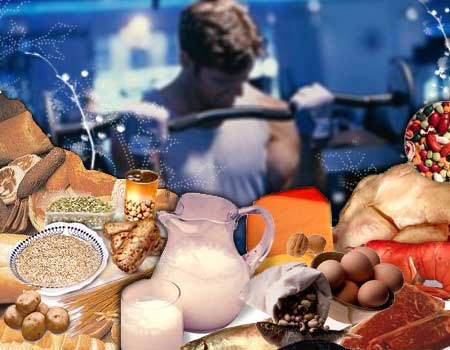Some people eat to live and some people, live to eat. Either way, some basic knowledge of nutrition can go a long way in improving your quality of life. Having looked at various forms of work-outs, BMI and calorie counts, our discussion would not be complete without a look at nutrition.
The body continuously consumes energy, even when we are asleep. This energy comes from the food we eat and by way of ‘burn-out’ of muscles. In this breakdown mode, the body is said to be in catabolic (break-down) state. In order to gain healthy muscle mass post work-out, the body should be in an anabolic (built up) state. This can be achieved through appropriately scheduled intake of balanced meals.
Modern day exercise nutrition has become a sophisticated science with athletes weighing and timing every meal! Doesn’t sound too recreational, does it? So while we won’t harp on the same ‘avoid junk food-take your vitamins story,’ what this feature aims to do is equip you with some basic understanding of nutrition.
If you hear the words ‘nutrition’ and ‘work-out’, the first thing that probably comes to your mind is protein supplements. If you are on a weight loss routine, starving is not the way to go; in fact, it can be counter productive. It is such notions that this feature aims to break.
Besides repletion of glycogen stores of the body that have been used up in a work-out, a post work-out drink is necessary to promote protein synthesis and reduce protein breakdown. We say post work-out drink because assuming you’ve put in some effort and not just whiled away your time ogling at the hottie on the treadmill; your body would have lost a lot of water and essential electrolytes.
Information and offerings for sports drinks are in multitudes that are thoroughly confusing. And with names like Muscles Mike’s growth miracle, you wouldn’t want people wondering what you are up to! The lure and pit-falls of such magic potions can perhaps be dealt with in another feature.
While protein is of course required to be part of any post work-out meal, carbohydrates are also equally important. Besides replenishing energy, the spike in blood insulin levels caused by the carbs boosts protein intake by muscles. Carbohydrates with high glycemic content are best as they are rapidly absorbed. A banana or a papaya following a work out would be good. This premise would hold good for all types of work outs from weight training to salsa and aerobics.
Proteins
Not all proteins are the same. Different proteins have different levels and combinations of the 20 amino acids. Of these, 9 are considered ‘essential’ as these cannot be synthesized endogenously by the body and hence need to be present in the diet. The biological value of a source of protein is determined by the amount and proportion of the essential amino acids. If one or more of these amino acids is not present or is present in disproportionate amounts, the efficiency of protein synthesis goes down.
Animal sources of protein- meat, fish, dairy and poultry are more ‘complete’ than plant sources as they contain all the essential amino acids. However, with the right combination, even plant sources can suffice. Among plant sources, Soya protein scores the highest; it is comparable to animal sources of protein. Whey protein and soy are the best vegetarian choices of supplementation.
How much?
-is the big question.
The amount of protein required is also a point of debate with various figures quoted from gms/kg of body weight to gms/pound of body weight to gms/gm of body weight. Off course, daily needs depend on age, gender and level of activity. Higher amounts of protein are needed during teenage, pregnancy and lactation. If you are not a born athlete but have somehow managed to drag yourself to the gym, we will suggest only a few simple numbers. The maximum usable of amount of protein in a day by the human body is 2gms/kg of body weight or 1gm/lb. So if you are starting out with moderate intensity workouts, 1gm/lb would be advisable. If you are moving up to regular high intensity exercise, you need to go up to 2gm/lb.
To give you a rough idea:
When?
As mentioned, post-work is the best time for protein intake when absorption and possibly assimilation levels are the highest. Long periods of fasting after a work out can undo all the work you’ve put in. Break your meals down into smaller and more frequent portions. So lunch and diner don’t have to be so elaborate as to seem like the last meal you’ll ever have. In other words, don’t stuff yourself till not a morsel will go in!
Equally important is rest periods when muscle gain actually happens. If the body is continuously involved in activity with inadequate rest, a catabolic state results in which meaningful gains in weight are near impossible. It has been proven that erratic sleep patterns and eating habits lead to unhealthy weight gain. So unless diet and nutrition are taken care off, all your efforts are wasted.
Even if you are on a weight loss routine, carbohydrates in your post work-out meal won’t add fat as calories keep burning even post work-out. A simple balanced work out along with 10-15% of energy coming from protein should work for all. If you are finding it hard to put on weight, you are probably not getting enough calories and enough rest.
-Punit G. Pania

